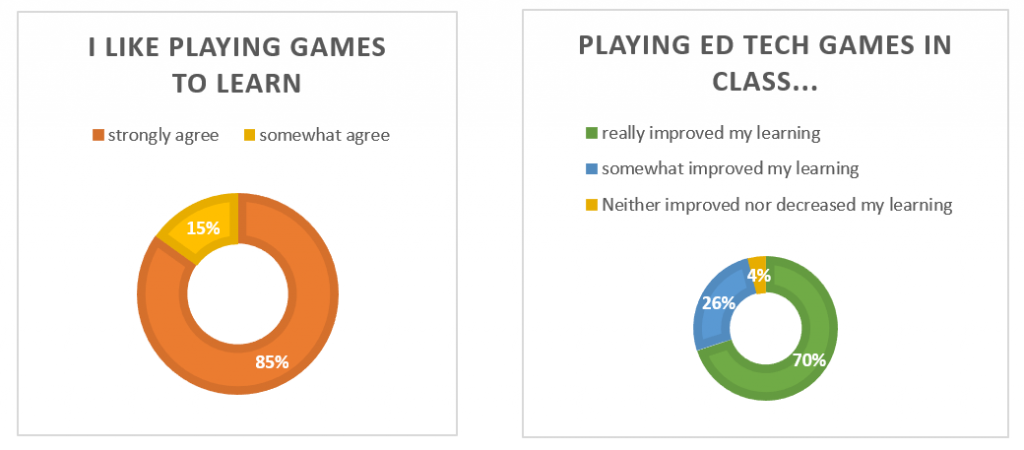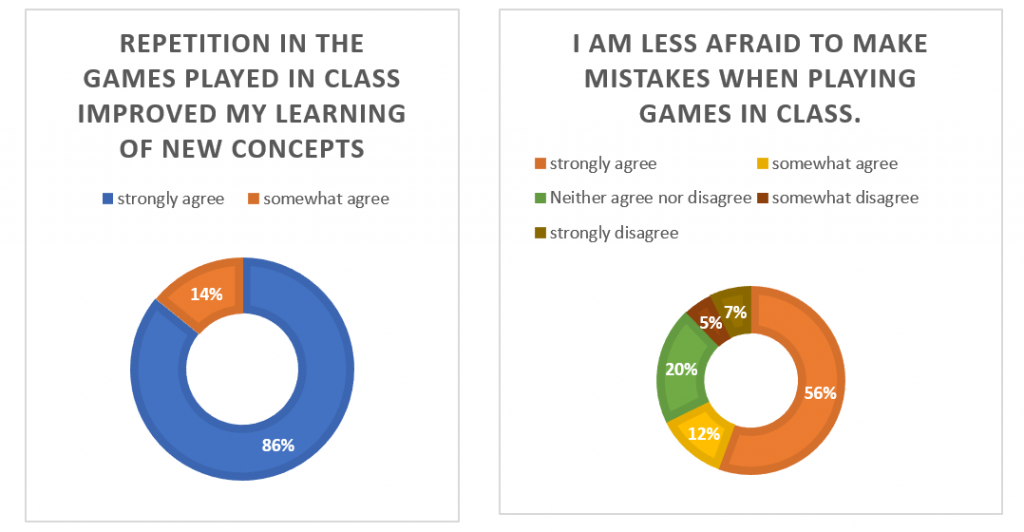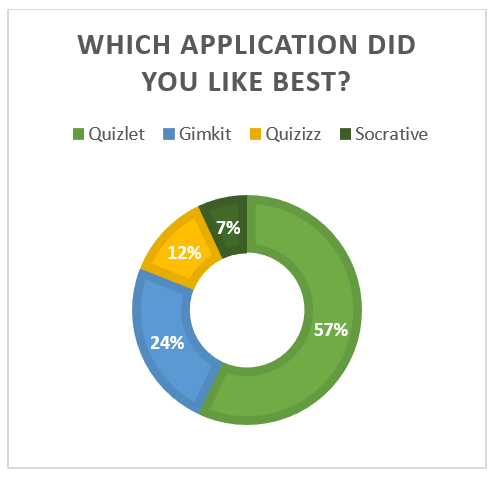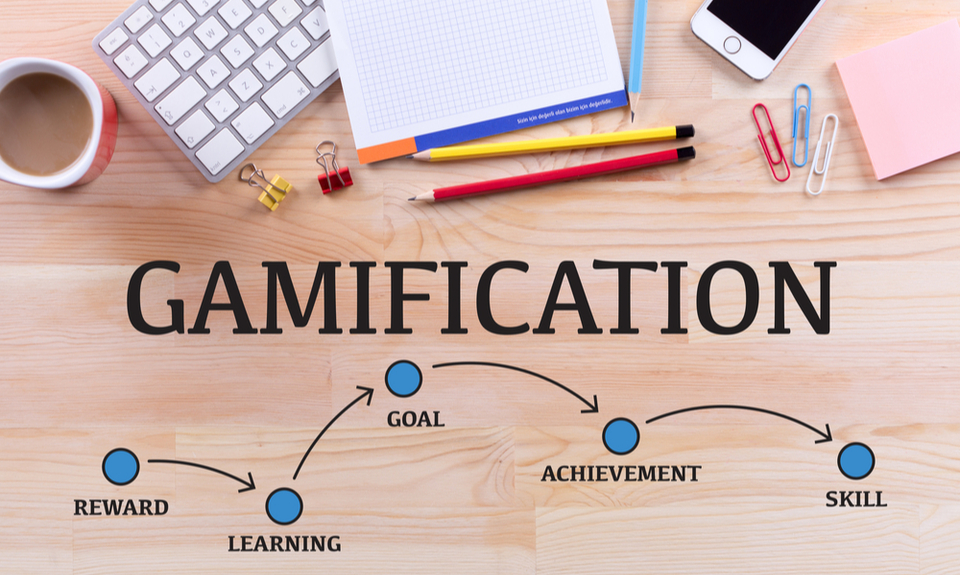Everybody knows Kahoot!, but there are many more tools that you can use to gamify your lessons.
We will showcase and compare four different gamification applications that can be easily implemented into your course. But before presenting those specific applications, let’s remind the skeptics of the benefits of gamification.
Advantages of gamifying your lessons
- Increase student engagement
- Tone down the stress effect linked to making mistakes
- Provide immediate feedback to students
- Increase retention of material from repetition
- See detailed statistics for both the group and each individual student
- Reuse games an infinite amount of times
What do students think about gamification?
It’s one thing to defend gamification from a teacher’s viewpoint, but what about the students? What do they really think about gamified lessons? Seventy-four undergraduate students at SKEMA Business School were given an anonymous survey about gamification. Here are the results of that survey



But which fun app should I use?
Here is a comparative guide to trending gamification applications.
Quizizz
What is it?
Quizizz is a fun modern interface with bright colors and smooth music that is often directly compared to Kahoot!
How it works
The main feature that stands out during game play is the live leaderboard. As they progress, students’ names jump up and down the teacher’s screen from last place to first place. This creates a truly dynamic competitive experience and puts non-threatening pressure on students to get answers correct if they want to move up on the leaderboard. Teachers can also view the group’s live accuracy rate. The teacher can thus use this to motivate students to reach a collective goal that is visually represented as the quiz progresses.
Gimkit
What is it?
Gimkit integrates real strategy into its gameplay. Winning may not necessarily be determined by the student who gets the most answers correct, but rather by the student (or team) that chooses the right bonuses or attacks on other players.
How it works
In Gimkit, students can go “shopping” in between questions to purchase bonuses such as multiplying your earnings (X2, X3, X4) or streak bonus which adds money for answering two questions correctly in a row, or even purchasing insurance to protect yourself from losing money when you make a mistake. You can purchase special power ups that lets you freeze the screen of a specific classmate (or team) for 15 seconds, unless that classmate has chosen to purchase a shield to protect themselves from attacks! Questions are repeated continuously until the timer runs out. This repetition helps the students memorize the content in a fun way. This is quite a unique feature because often in other applications questions are seen just once. Be careful, there is a learning curve for getting students to understand how to play. It may take a few tries.
Socrative
What is it?
Socrative is the Swiss Army knife of my teacher tools because it is so flexible that you can fit almost any type of content into it. I often prefer Socrative to other applications when I do not want to gamify my quizzes.
How it works
As for Socrative’s gamification element, it’s the most basic of the bunch. A classic race with a progress bar for each player (or team) that moves towards a finish line (the end of the quiz). If you get a question correct, you move forward. If you get it incorrect, you stay put.
Note:
If you are less interested in gamification but looking for something that is versatile and user-friendly without all the bells and whistles, please read my other article 10 Ways to Use Socrative.
Quizlet Live
What is it?
Quizlet Live is the class favorite. Quizlet’s design is based on a flashcard system where you match a targeted term with its definition, a synonym, or image. This means that you cannot have multiple-choice, polling, or open-ended questions. Nevertheless, if you are reviewing vocabulary in your lessons, there is no better application.
How it works
First, the game is set up as a race with a progress bar. Students are split into teams and randomly given an animal mascot for their team such as koalas or dolphins or mustangs. The key difference with Quizlet Live is that it connects all the devices from one team together. To clarify, students in a team are simultaneously prompted with the same term on their own individual device, however, only one member of the team has the correct definition. This means that they must communicate with each other before a member of the team selects an answer on their device. If they make a mistake, their progress bar goes all the way back to the beginning. Once a team makes a perfect run to the finish line, the game stops on all the devices and a picture of the winning team’s mascot is shown. I cannot tell you how many times I’ve received complaints from teachers in nearby classrooms because of all the excitement taking place during a Quizlet Live game. The suspense to get to the finish line is palpable and every time we finish a race they beg to go again.
Finally ...
- Which app creates the best competitive atmosphere? It’s a tie between Gimkit and Quizlet Live. While Gimkit is more strategic, Quizlet Live builds more suspense.
- Which app makes for the best collaboration and teamwork ? Quizlet Live, with Gimkit not too far behind. Quizlet forces students to communicate with each other before agreeing on what to choose as the correct response. However, in both Quizlet Live and Gimkit, the students are working together to achieve a common goal.
- Which app delivers best individual student play (every person for themselves)? It’s a tie between Kahoot! and Quizizz. Kahoot! is better when the teacher wants stop and follow-up after each question. Quizizz is better if you want to let the students work through all the questions at their own pace.
- Which app is the most versatile in terms of functions, question types, and gaming? Socrative, however this article was written before I discovered Wooclap, and even though I have limited experience with it, it has already shown to be very promising!






